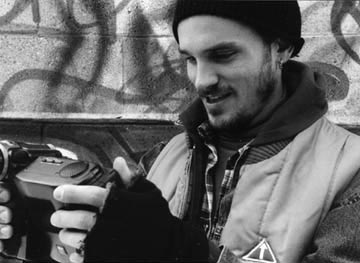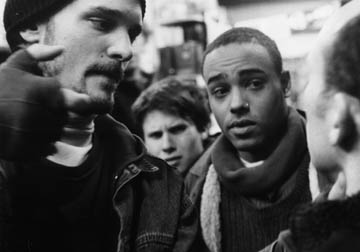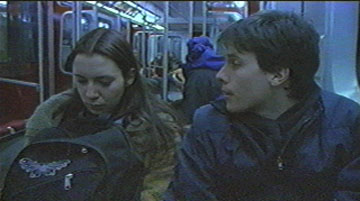
Johnny is the story of a group of squeegee kids -- those annoying wretches who clean off your car windshield, whether you want them to or not, whether it is filthy with grime or sparkling fresh from the car wash, and then demand money from you -- and "Johnny," their leader. Johnny is a sociopath: violent, callous, dishonest, and charismatic in the extreme; he is The Street's version of a Bush or a Kennedy. Johnny can beat the cr*p out of you one minute and then have you fawning all over him just so that he'll give you some crumb of affection in the next. Johnny is not a nice person. History shows us, however, that while not all "nice guys finish last," a charismatic bad guy can live on for ages if he has the right sort of publicity. Johnny, a no-name petty hoodlum, discovers the instrument of his own dubious immortality in a video camera.

Johnny is the first North American feature film to be produced in the Dogme 95 style which began in Denmark and has given us several international hit movies in recent years, including The Idiots and The Celebration. Dogme 95 is anti-Hollywood-glitz: to comply with the style's rules, the film must be in color but only natural light may be used in a scene with no filters or optical effects used (try running that suggestion past a Hollywood cinematographer!), all shooting must be done in its actual location and no extra props may be brought to sets, all action must be done in the "here and now" (which precludes murders and such-like, for nothing must be artificially staged), the film must be in Academy 35 mm format ("3 by 4"-- the same dimensions as an old movie or a television set), and the director must not be credited. The last rule is particularly galling to The Director's Guild of America and its rules, so let me just say that Carl Bessai wrote Johnny and leave it to the astute reader to figure out who the director was.

Clearly, Dogme 95 is not the style for everyone. Indeed, what often happens to unprepared viewers who see a Dogme 95 movie is a set of reactions which runs something like this: "Who are these people?" "Why are they there?" "Why should I care?" "Now who's that?" "What do they have to do with . . . ?" "Oh! Now I get it!" "Hey, this is terrific!" "Wow, that was some movie!"
This is precisely the course of events experienced by this reviewer and those whom he has interrogated regarding Dogme 95 films, including Johnny: there seems to be a slow, painful rise for fifteen minutes or so, during which we first meet all of the characters (it is against the rules to introduce them artificially, remember -- they have to meet each other naturally), then wonder what any of them have to do with each other, and then spend the rest of the film in awe as their lives intersect and intertwine towards a climax which may be completely surprising, but which, on reflection, turns out to have developed naturally from the personalities of the characters and their relationships.
In one of the slickest Hollywood films of all time, The Godfather, the transformation of one character into Vito Corleone's successor may be surprising, but given what we know of his background and the background of his brothers, the ending only works if we know that Michael is the war hero brother who wants to go legitimate, Sonny is the violent rake who is banging a bridesmaid against a door at his sister's wedding, Tom Hagen was never even adopted, and Fredo is the brother who is sent out to get drinks and open doors for other people. Cut out Connie's wedding and the Don's meetings from the beginning of The Godfather and the movie's ending makes no sense; cut out the slow build-up of the characters in a Dogme 95 film and cut straight to the action, and you have plenty of nothing. Let the stories develop naturally, however, and the product packs quite a punch.

In Johnny the build-up is as slow and steady as it is in its European cousins. We meet Alice (Gema Zamprogna), a runaway from a nice, middle-class home who returns one evening to tell her sister, Dell (Vanessa Shaver), that she is pregnant, but who refuses to leave the streets where Johnny (Chris Martin), his seeming best friend Albert (Clinton Walker), and Gus (Rainbow Sun Francks) take advantage of her in various ways. One of them may even have impregnated her -- she won't say. Dell, who is bored with her comfortable bourgeoise lifestyle, insists that Alice introduce her to her street friends, and Alice finally consents.
Out of sorts because of her pregnancy, Alice can't fully participate in the gang's rough-housing and petty crime, and when Johnny gets a video camera from Albert, he becomes entranced by its power of capturing images and immediately decides that Dell, not Alice, must "star" in the "scenes" which he has his followers enact. (In good Dogme 95 style, from this point on in the film, most of the action is actually filmed not simply from Chris Martin's point of view as "Johnny," but by Chris Martin himself.)
As Alice and Dell shift roles, with Alice returning home and Dell turning to the thrill of street life, the final main character is brought into play, when Dell, on her way to the streets, meets Sean (Gemini Award winner Kris Lemche) and brings him into Johnny's circle, too.
Johnny seems to instinctively realize that in Sean he has a born follower and disciple, one who will act as a catalyst to insure the obedience of Johnny's other followers. Sean is made official cameraman of Johnny's mysterious video vision, and he dutifully records the increasingly harsh and humiliating "scenes" which Johnny has his little troupe of amateur players enact for his private pleasure. Obedient and subservient as a puppy, Sean is quickly placed in front of the camera, too, so that Johnny can cement his absolute control over his followers.
Johnny's group is soon under constant surveillance by the camera, which amuses the dimmer bulbs among them but makes the smarter ones realize that they are at Johnny's mercy: he can not only see into their souls and manipulate what he finds there, but his camera, like a Recording Angel, captures both their sins and their confessions, and Johnny can use his tapes to control them, like Satan pointing to the weaknesses of Job.
Johnny's life itself is a sham, however. He is not a street kid any more than is Alice; he lives in a small, unglamorous house with his "Ma" (Kyra Harper), in a curious relationship which bears comparison to that between Cody Jarrett and his "Ma" in White Heat, and when Albert unwittingly intrudes into that relationship, Johnny immediately sets him up for a fall, which is duly recorded on the camera.
Johnny must maintain the illusion of both self-mastery and unreserved love for his followers, and even though he himself has set up Albert, in plain sight of the others and as recorded on the camera for all to see, he immediately launches a plan for a final scene for his enigmatic epic, into which he coerces the participation of all of the others, through love, fear, or outright abuse.
Johnny is due to be released later in 2000, and should be placed near the top of any cinema fan's "Must See" list. Bearing in mind that this is a gritty Dogme 95 movie and not a smooth piece of Hollywood schmaltz, anyone who can see past the surface into the guts of a film must recognize this as a landmark of Canadian film-making, and one which will shake the over-commercialized U.S. "independent" film industry back down to its roots.

With the rise in theater ticket prices and the growing international audience of our page, our old NW2: Not Worth $2 (U. S. dollars) to W8: Worth $8 rating scale has become less useful than previously, so, in line with the scale used by the Internet Movie Database (IMDb) we have adopted a scale of 1 star to 10 stars, with "1 Star" being a VERY bad movie, and "10 Stars" being a movie classic. Our On-Line Reviewer, however, has gone where IMDb has never gone before: he has added a score of Zero for those movies which are so bad that they are not even good "camp" -- movies so bad that not even "Mystery Science Theater 3000" could could make them worth watching.
On this scale, anything rated "7 Stars" or above is definitely worth the cost of a theater ticket, "8 Stars" is worth standing in line to buy a ticket, "9 Stars" is worth standing in line in a driving rain rainstorm or severe heatwave or moderate windstorm to buy a ticket, and "10 Stars" is a movie worth driving hundreds of miles to go see -- at least in Dr. Shea's own opinion. Accordingly,

